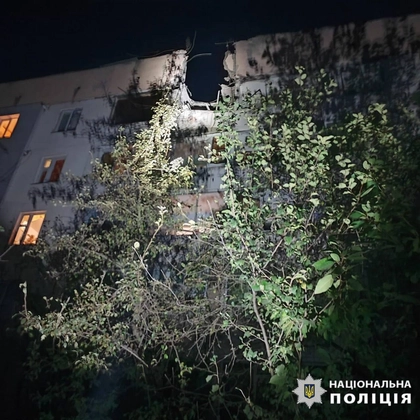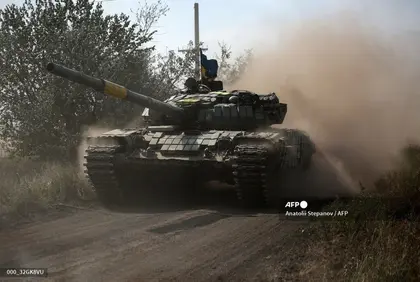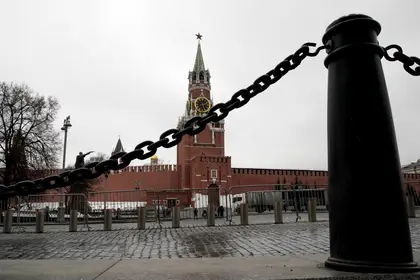Russian President Vladimir Putin accused Washington on Tuesday of drawing out the war in Ukraine, as explosions rocked a Russian military facility on the Kremlin-controlled peninsula of Crimea.
The first UN-chartered vessel laden with grain meanwhile left Ukraine for Africa following a hallmark deal brokered by Turkey and the UN to relieve a global food crisis.
JOIN US ON TELEGRAM
Follow our coverage of the war on the @Kyivpost_official.
“The situation in Ukraine shows that the US is trying to prolong this conflict,” Putin said, addressing the opening ceremony of a security conference in Moscow.
Washington is “using the people of Ukraine as cannon fodder”, he said, lashing out at the United States for supplying weapons to Kyiv.
Russia invaded Ukraine in February, anticipating little military resistance and hoping for a lightning takeover that would topple the government in Kyiv within hours.
But after failing to capture the capital, Russia’s military instead has become entrenched in a protracted bout of attrition with the sprawling front line in the east and south.
The United States has provided key economic and military backing to Kyiv, in particular supplying Ukraine with long-range, precision artillery that has allowed it to strike Russian supply facilities deep inside Moscow-controlled territory.
Huge fireballs erupted at the site in Crimea early on Tuesday where ammunition was temporarily being stored and clouds of black smoke billowed into the air, images posted on social media showed.

Kyiv Hit by Massive Drone Attack as Russian Strikes Target Multiple Ukrainian Cities
The defence ministry said the blaze began at around 6:15 am local time (0315 GMT) at a temporary military storage site near the village of Mayskoye in the Dzhankoi district, causing ammunition to detonate.
The blasts on Tuesday come one week after at least one person was killed and five more injured in similar explosions at a Russian airbase in Crimea.
Ukraine has not directly claimed responsibility for either of the incidents in Crimea, but senior officials and the military have implied Ukrainian involvement.
– ‘Catastrophe’ –
Ukrainian presidential aide Mykhailo Podolyak said on Tuesday the latest blasts in Dzhankoi were a “reminder” that “Crimea occupied by Russians is about warehouses explosions and high risk of death for invaders and thieves”.
He said the blasts were “demilitarisation in action” — using the same term used by Russia to justify its invasion of Ukraine.
Russia annexed Crimea from Ukraine in 2014 and has used the Black Sea region as a staging ground for its invasion.
Meanwhile in the eastern Donbas region, which has seen most of the fighting, Ukraine said Russia had launched a “massive” offensive from an oil refinery in the recently-captured city of Lysychansk in Lugansk province.
Ukraine’s presidency said one woman was killed and two more injured in Donetsk province, which together with Lugansk makes up the industrial Donbas that is now mostly controlled by Russian forces.
Kyiv and Moscow have also traded accusations over a series of strikes this month on Zaporizhzhia nuclear plant in southern Ukraine — Europe’s largest.
On Monday, Ukrainian President Volodymyr Zelensky warned a “catastrophe” at the Russian-controlled facility would threaten the whole of Europe.
– ‘Symbols of repressions’ –
On the Black Sea, the UN-chartered vessel departed on Tuesday from the Ukrainian port of Pivdennyi and will sail to Djibouti “for delivery to Ethiopia”, Ukraine’s infrastructure ministry said.
The MV Brave Commander, loaded with 23,000 tonnes of wheat, was able to leave after a deal agreed last month lifted a Russian blockade of Ukraine’s ports and established safe corridors through the naval mines laid by Kyiv.
Ukraine has said it is hoping there will be two or three similar shipments soon.
Russia’s invasion has driven an economic, political and cultural wedge between Moscow and European capitals.
The prime minister of Estonia, which was formerly Soviet-ruled, said on Tuesday her government had decided to remove all Soviet-era monuments from public spaces in the country.
“As symbols of repressions and Soviet occupation they have become a source of increasing social tensions – at these times, we must keep the risk to public order at a minimum,” Kaja Kallas wrote on Twitter.
The move follows similar trends in Poland and Ukraine, which began tearing down statues of Soviet leaders in earnest after Russia-backed separatists wrested control of swathes of the east in 2014.
You can also highlight the text and press Ctrl + Enter






